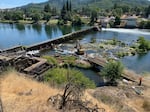
Construction crews working at Winchester Dam near Roseburg, Ore., on Monday, Aug. 7, 2023. Crews were lowering water above the dam to prepare to make repairs on the privately owned dam.
Erik Neumann / JPR
There are now questions about accountability for the repair work that was done at the Winchester Dam near Roseburg.
Representatives from the Oregon Water Resources Department, Oregon Department of Fish and Wildlife, and Oregon Department of Environmental Quality gave a presentation to the Oregon Senate Interim Committee On Natural Resources and Wildfire on Wednesday.
They discussed repair work that was done on the 16-foot-high, wood and cement Winchester Dam. The work included reinforcing the dam face with concrete and steel and filling voids in the dam with injected polyurethane foam. But draining the reservoir behind the dam dropped water levels, requiring emergency rescue efforts of Pacific lamprey.
The permit for the project from NOAA Fisheries said the number of dead juvenile lamprey was not supposed to exceed 30,000.
But Shaun Clements, acting deputy director of fish and wildlife for the Oregon Department of Fish and Wildlife, said Wednesday the total number of dead lamprey was actually much higher.
“There was a fish kill. It was on the order of hundreds of thousands of lamprey, and by statute that could result in significant financial damages,” he said at the meeting.
ODFW declined to explain who might be liable for paying those damages as a result of violating state statute pertaining to unlawful killing of wildlife.
“The agencies did have staff on site throughout the project observing activities. We did collect a lot of information about project activities during that period that we’re still analyzing,” Clements said. “There was evidence of DEQ violations, and again, they could be liable for civil penalties in that case.”
In the meeting, senators pressed state agencies on the timeline for an official report about the dam work, but Clements repeatedly declined to specify when that report might be completed.
The Winchester Dam near Roseburg is owned by the landowners who live along the banks of the resulting reservoir, collectively called the Winchester Water Control District. Construction permits for the project were approved by state and federal agencies. The contractor repairing the dams was TerraFirma Foundation Systems, whose owner is also the president of the Water Control District.
The project has frustrated environmentalists, who say temporarily closing the dam’s already outdated fish ladder further stressed fish species like steelhead, lamprey and Oregon Coast coho salmon, which are listed as threatened under the Endangered Species Act. And they say the aging, privately owned dam that primarily benefits local residents should not be allowed to exist in the first place.
“The members of the Winchester Water Control District remain committed to responsibly managing and maintaining the Winchester Dam and to continuing to work with our agency partners to operate and improve the efficacy of the fish ladder,” Ryan Beckley, the president of the district and the owner of TerraFirma Foundation Systems, said in a statement from early August. He did not respond to a request for comment Wednesday.
The repair work was permitted to occur between Aug. 7 and Aug. 28. However, the Winchester Water Control District applied for two extensions to complete the work, which were both granted, and the work concluded on Sept. 6.
Sen. Jeff Golden, the chair of the committee, said Wednesday that it is important to insist on accountability for this project.
“What we have heard from a number of people with different opinions is that oversight and regulation of this facility has not been as transparent as it needs to be given the importance of this public resource,” he said. “I will, as seems necessary, push for transparency and making the information that I think the public deserves on a resource this important.”
Golden said the committee might revisit this topic after the official report is completed.
Erik Neumann contributed reporting.